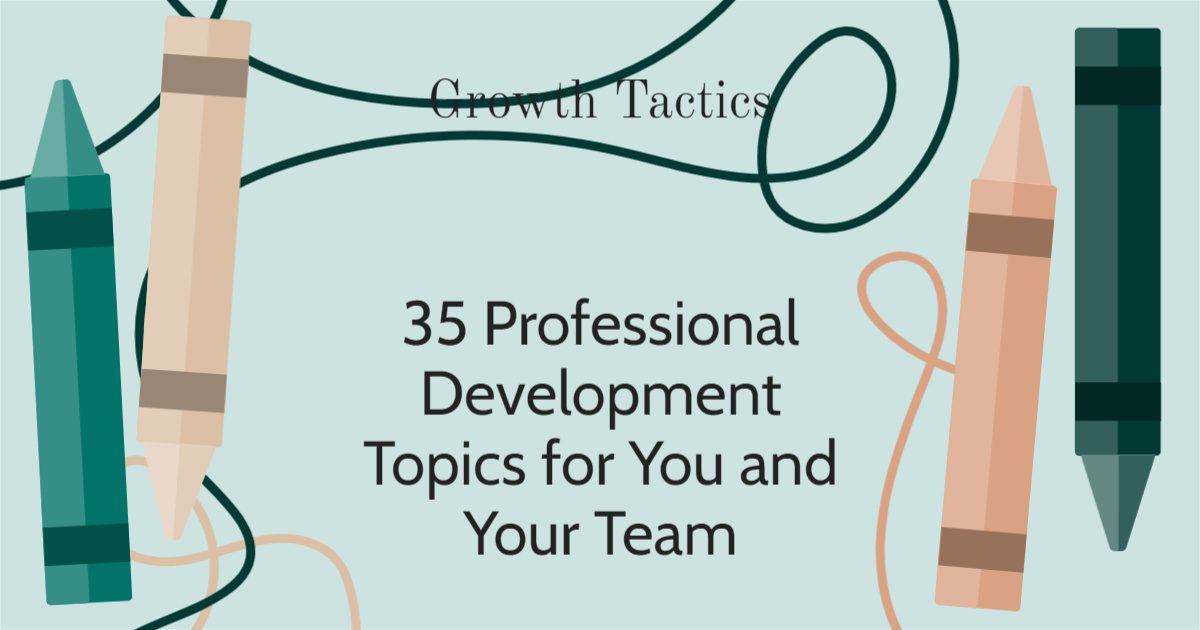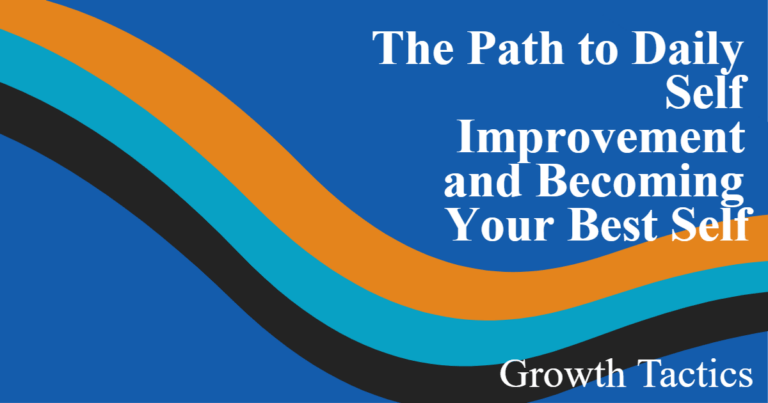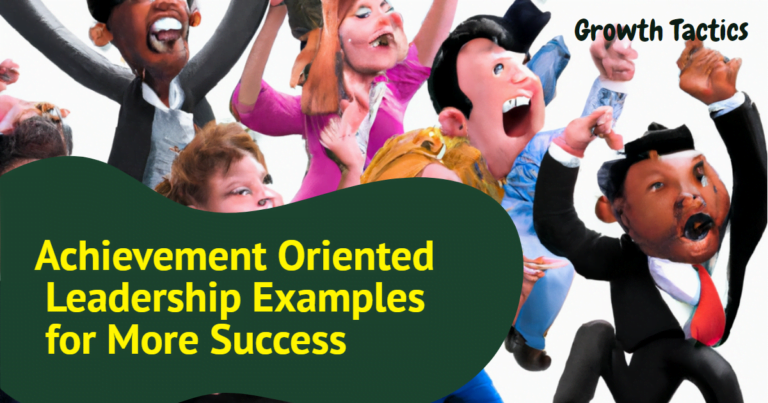What professional development topics do you need to focus on in your organization or your life?
We all have room to grow and improve. When you invest in yourself, you show leadership in the most powerful way. So dive in, choose what resonates with you, and let’s grow together. Your journey is your own, but we’re here to guide you along the way.
As someone who has dedicated their life to learning and pursuing personal development, I’ve got you covered. In this article, we’ll cover 35 professional development training opportunities that you or your team can engage in to become more effective at work and in life!
Jump To Section
What Is Professional Development?
Professional development is a lifelong process of learning new skills and improving existing ones. It’s about learning about new topics that you didn’t know before, and it can be done in many different ways, including through formal training, on the job, and independent study.
The Importance of Varying Professional Development Topics
It’s important to note that professional development is not a one-size-fits-all. It’s important to find topics that are relevant to you, your team, your organization, and your industry.
For example, if you focus on business strategy and leadership skills for one year, then consider adding technical training and customer service skills the next.
The more variety you can offer in your professional development plans, the more likely everyone will find something that interests them and improve their management skills.
Now let’s get to the 35 professional development topics for you or your team.
Ultimate List of Professional Development Topics

1. Communication
Renowned leadership expert John C. Maxwell emphasizes the importance of communication by stating, ‘Effective communication is not just about talking, but rather about understanding and being understood.’
It’s important that you and your team communicate effectively. It’s a skill that can be learned and improved, just like any other. When it comes to communication, several components are essential for successful exchanges:
- Listening skills
- Active listening
- Body language (nonverbal cues)
See Related: 14 Communication Barriers: How To Overcome Them
2. Leadership Development
Leadership is a skill, not a title. It is an art, not a science. It can be exercised by anyone, regardless of their position or title. From the CEO down to the person who sweeps the floors, leadership can be exhibited by all.
Give everyone an opportunity to develop their leadership skills, and your team will be better off for it. The best way to develop leadership skills is by giving people the opportunity to lead.
Allow them to make decisions on their own and provide feedback after each one. This will give them an opportunity to learn from their mistakes, as well as experience the benefits of making good choices.
Renowned author and leadership expert Stephen Covey reminds us that ‘Leadership is a choice, not a position.’
See Related: How to Be a Highly Successful Introverted Leader
3. Mentoring Others

According to a survey by the American Society for Training and Development, 71% of Fortune 500 companies have implemented mentoring programs as part of their talent development strategy. This highlights the recognition of the significant benefits of mentoring in professional growth.
Mentoring is a form of professional development that involves helping someone else learn, develop, and improve their skills. It can be a one-on-one relationship or a group activity.
It’s different from coaching in that mentoring focuses on teaching other professionals to help them grow, while coaching focuses on giving advice about how to solve specific problems.
Mentorship can be formal or informal, depending on your needs and goals for the project at hand.
For example, if you need help learning about new technology for your industry but don’t have time for face-to-face meetings with an expert before starting your job search process (or after), online mentorship may be ideal for you!
4. Effective Delegation
Renowned management consultant Brian Tracy once said, ‘Delegation is one of the most important skills you can develop. It allows you to multiply your effectiveness and accomplish more in less time.’
If you’re a manager or leader, delegation is essential. It’s a way to assign tasks to others in your organization and allow them to take on more responsibility.
Effective delegation can also help you become more efficient because it frees up your time for other responsibilities.
Delegation is one of the most important skills for a manager or leader because it allows you to delegate tasks that are either too easy or too difficult for you.
For example, if there’s someone in your organization who knows how to use a new software program better than you do, delegating this task could save you hours of work over the course of an entire project.
See Related: How To Empower Others To Do Great Things

5. Brainstorming Techniques
Brainstorming is a super effective group activity that’s been used for a long time to come up with awesome new ideas and find solutions to problems. It’s helpful in pretty much any situation where you want to think up new ideas or solve issues.
The idea behind brainstorming is that no idea is a bad one—every idea is good and worth considering.
During a brainstorming session, it’s important to create a relaxed environment where everyone feels comfortable sharing their thoughts and ideas. This way, you can have an open discussion that leads to unique and creative solutions.
The main idea is that there are no bad ideas, so everyone can share their thoughts without worrying about being judged.
Brainstorming is also great for building teamwork. When people work together to come up with new ideas, they learn to trust each other more, communicate better, and understand how each person thinks. This helps the team work together more effectively in the long run.
Business mogul Richard Branson once said, ‘Brilliant ideas are often born in a moment of spontaneous teamwork.’
6. Building Trust in the Workplace
According to a study by the Great Place to Work Institute, high-trust organizations experience 50% lower turnover rates than their low-trust counterparts.
This highlights that trust is not only important for individual relationships but also has a significant impact on overall organizational performance.
Trust is a key component in all relationships, including the workplace. You can’t have a good relationship with your coworkers or supervisor if you don’t trust them.
Trust is important because it allows you to feel confident that the people around you are going to do what they say, how they say it, and when they say it.
If there isn’t trust in the workplace, team members may be reluctant to share ideas or information with each other.
7. Improving Confidence
As motivational speaker Zig Ziglar said, “Confidence is not they will like me. Confidence is I’ll be fine if they don’t”.
Being confident is a learned skill. The ability to ask for help, admit mistakes, and say yes or no are all things that we can practice and become more comfortable with.
Confidence can be built over time by taking on new challenges and successes until you feel increasingly sure of yourself in situations where you might have been unsure before.
Just as it takes time to build muscle by lifting weights, it takes time for your mind to learn how to be confident in itself. There are no shortcuts!
8. Workplace Ethics
Workplace ethics are a topic that’s often overlooked in professional development, but they can be an important part of your team’s culture.
Let’s break it down: Ethical behavior is about following moral principles and values in our everyday lives. It’s important not just for following the law but also for how we treat other people, especially at work, where our actions might be hidden from the public.
Ethics in the workplace can make a big difference in how we work together and build a positive environment. Here are some examples of ethical behavior at work:
- Be honest and open: Always tell the truth, share information, and don’t try to deceive others.
- Show respect and empathy: Treat your coworkers with kindness, listen to their thoughts, and appreciate their input.
- Be fair and treat everyone equally: Give everyone the same opportunities and don’t discriminate based on things like gender or race.
- Take responsibility: Admit when you make a mistake, learn from it, and be responsible for your actions.
- Keep information private: Protect sensitive details and respect the privacy of your coworkers and clients.
- Follow rules and policies: Stick to your organization’s guidelines, industry standards, and laws to maintain a high ethical standard.
- Avoid conflicts of interest: Recognize when your personal interests might affect your professional judgment and handle those situations carefully.
9. Financial Development

Financial development is a topic that’s practically guaranteed to get your employees talking. The truth is, we all have financial questions and concerns, and we want to be able to discuss them with someone who knows what they’re talking about.
Your team will benefit from learning more about the following topics:
- Financial literacy
- Budgeting
- Saving
- Investing in retirement accounts (Roth IRAs and 401(k)s)
- Insurance policies like home and auto insurance, as well as life insurance
10. Emotional Intelligence
Emotional intelligence is the ability to identify and manage your own emotions and the emotions of others. It’s an important skill for leaders, but it’s also critical for success in any aspect of life. Emotional Intelligence can be broken down into the following topics:
- Recognize your own emotions. This means knowing when you’re feeling happy, sad, angry, frustrated, or another emotion. And why you’re feeling that way?
- Recognize other people’s emotions by observing their facial expressions and body language. Listening closely to what they say about how they’re feeling. Asking questions about how someone is feeling (instead of assuming). Using empathy toward someone who seems upset. Suggesting options instead of making judgments (e.g., instead of saying “You shouldn’t be so sensitive,” try saying “I wish things were different.”).
- Manage your feelings by understanding their causes (e.g., recognizing that being late has nothing to do with me being unprofessional). Recognizing that our emotions are fleeting and not permanent. Pay attention to what we’re feeling, rather than acting on impulse. Take action (e.g., getting up and walking away) if you feel like a situation is becoming too heated or stressful.
As renowned psychologist and author Daniel Goleman stated, ‘If your emotional abilities aren’t in hand, if you don’t have self-awareness, if you are not able to manage your distressing emotions, if you can’t have empathy and have effective relationships, then no matter how smart you are, you are not going to get very far.’
11. Conflict Resolution
Conflict resolution is a skill that can be learned by anyone. It’s more than just learning how to talk through problems. It’s also about listening and finding solutions together, rather than assuming you have all the answers.
Conflict management is about finding common ground between people with different perspectives, so they can work together toward a common goal. It’s about problem-solving and communication. Knowing how to express yourself clearly, understanding what other people want or need from you, and making sure everyone feels heard during discussions.
12. Productivity
Productivity is a big word that means different things to different people. For some, productivity is about getting more done in less time. For others, it’s being able to balance work and personal life in a way that makes you happy.
One thing we can all agree on is that the only way to achieve those goals is by managing your time effectively. If you want your team members (and yourself) to be more productive, then they need to learn how to manage their time effectively and set goals for their projects within their respective teams.
You can teach them how by explaining the importance of setting goals. Not just personal ones but also team goals. So everyone knows where they’re going next with their projects. Make everyone understand that they don’t have to tick off every single task on their list daily. Instead, they should consistently work towards completing the most important tasks at any given moment.
See Related: 8 Tips to Improve Your Multitasking Skills and Get More Done
13. Negotiating
One of the skills you can learn is how to negotiate. Negotiation is a great skill for both personal and professional development because it improves your ability to get what you want from others.
Asking for what you want is an important part of negotiating, but listening to what others want is also key. As negotiation expert William Ury said, ‘Listening is the oldest and perhaps the most powerful tool of all in the negotiation arsenal.’ Often, people are willing to sacrifice their own needs if they see the other person’s commitment and capability to create a win-win situation by meeting halfway.
Learning about the needs of another person will help you understand why they have certain responses or behaviors, which helps with understanding their point of view and communicating effectively with them in general.
14. Team Leadership

Team leadership is a crucial skill to possess in today’s fast-paced and competitive world. As a team leader, you play a pivotal role in shaping the success of your team and, ultimately, the organization as a whole. Mastering the art of team leadership requires a delicate balance of soft skills, technical expertise, and a deep understanding of human psychology.
Motivating and inspiring your team is a key component of being a successful team leader. This involves understanding the individual needs, strengths, and aspirations of each team member and aligning them with the organization’s overall goals.
By fostering a positive work environment, recognizing achievements, and providing opportunities for growth, you can empower your team to reach their full potential.
Effective delegation of tasks is another essential aspect of team leadership. This entails assigning tasks based on the skills, aptitudes, and workload of each team member, ensuring that everyone has a clear understanding of their role and responsibilities.
By doing so, you can ensure efficient use of resources, prevent burnout, and maintain a high level of productivity.
15. Employee Relations
Employee relations is the process of managing and improving relationships between employees and their employers. Improving employee relations can enhance this crucial part of business success, leading to increased productivity, efficiency, and workplace profitability.
The following are some examples:
When an employee does not feel included in decision-making processes at work, it may lead to feelings of resentment or unhappiness with their situation. The result is that they will not be as motivated as they could be if they felt like they were being heard.
To combat this issue, you can implement an open-door policy where anyone on staff has access to speak with you about any issues that arise during their workday. This shows them that you care about them as an individual instead of just treating them like another cog in a machine, as many companies tend to do!
If your company implements specific policies without clear explanations, it’s likely that people won’t comply with those rules. So, ensure you provide clear clarifications when making changes.
16. Organizational Change Management
Organizational change management (OCM) is the process that organizations use to manage change within the organization. OCM is different than change management, which focuses on personal behavior and attitudes during organizational changes.
OCM plays a vital role in guaranteeing the successful implementation of changes without employees’ or stakeholders’ resistance. Moreover, it prevents issues related to morale, productivity, and employee engagement after executing the change.
Helping people adapt to their new roles within the system of an organization through training programs or other methods, like mentorship opportunities for those who may feel lost because of a job function shift due to restructuring efforts within their company’s leadership structure.
17. Diversity and Inclusion
Diversity and inclusion have become key topics in the workplace and for good reason. They can help a company reach its full potential by leveraging the unique talents of people from different backgrounds and experiences. This, in turn, helps attract top talent and retain it for long-term success.
Diversity and inclusion unequivocally offer benefits. They boost innovation, enhance decision-making through the inclusion of diverse perspectives, foster employee engagement as people feel integral to the system, decrease turnover rates as employees feel appreciated, and elevate customer satisfaction levels due to positive experiences with your brand.
To keep your company on top of its game, you will want your team to be as informed as possible on best practices for creating a diverse workplace. First things first, what do we mean by diversity? Diversity is not just about race or gender.
It’s also about having different experiences and perspectives on things like age. A 29-year-old may see something different from his 57-year-old colleague. Some other categories are:
- religion/spirituality/nonreligious belief system
- sexual orientation/gender identity/expression
- socioeconomics status
18. Social Media Strategy

Social media platforms are a great way to connect with customers, but they can also be used to share content and build trust. A social media strategy is all about using social media as a marketing tool.
- Share information: Social media is an excellent channel for sharing valuable content that your audience can use. By regularly sharing relevant, useful information on your business’s Facebook page or Twitter account, you’ll establish yourself as an authority in your industry and help educate potential customers about your product or service.
- Build trust: A strong social presence helps companies build rapport with current and potential customers by creating brand advocates. When people see real humans behind the company name, this naturally builds trust between them and when someone trusts a brand enough to share it with their friends and colleagues via word-of-mouth marketing, that’s huge!
- Promote your brand: The most successful brands on social media are those who actively promote themselves while engaging with their followers (customers). You should also know how much time you’re willing to spend on maintaining these accounts. If you have multiple employees managing different accounts across different platforms, then make sure they each have clear guidelines in place so there’s no confusion when responding to messages from fans/customers/followers, etc.
19. Data Analysis
Data analysis is one of the most important skills for a business to have. It’s how you know what’s happening in your business and how you make decisions about where to focus your efforts.
But what exactly is data analysis? At its most basic level, it’s just the act of pulling data out of the various places it lives in a company (usually spreadsheets or databases) so that you can then use that information to make better decisions.
You can use data analysis in many different ways. If you want to understand customer behavior, if your goal is sales growth or retention, or even operational efficiency, data analysis can help achieve those goals.
20. Presentation Skills
Presentation skills are an essential part of being successful in business. Your ability to get your point across in a clear, concise, and convincing way will be vital for you to progress in your career.
There are several ways that you can practice this skill:
- Practice your presentation out loud, alone or with someone who is willing to listen.
- Record yourself practicing and then watch it back (either on video or audio). Carefully listen for any stumbling points and keep trying until you eliminate them.
- Get feedback from other people by asking them what they thought about the content of your presentation and how you presented it (they don’t necessarily have to tell you what they liked).
21. Public Speaking
As a professional, you’ll likely encounter several situations that require public speaking. These might include giving presentations, speaking at meetings, or even standing in front of an audience as part of your job responsibilities.
Regardless of the scenario, it’s important that you know how to effectively prepare for and deliver speeches so that they make an impact on listeners. You can improve your public speaking skills by taking a course in presentation skills.
This will help you learn how to effectively create and deliver presentations. You should also practice your speech ahead of time so that you’re comfortable with it when the time comes for delivery.
See Related: 9 Public Speaking Tips to Beat Those Nerves
22. Problem-Solving
Problem-solving is a skill that can be learned and developed. If you want to improve as a problem-solver, it’s important to understand that there are different types of problems and different approaches for how to resolve them.
- The first type of problem is called an analytical problem. These are the things that you look at logically and come up with a solution based on what makes sense from an objective point of view. Examples include navigating construction zones or ordering pizza over the phone.
- The second type of problem is called an adaptive problem. These are more about intuition than logic, and require creative thinking in order to find solutions that work well but aren’t necessarily what you’d expect or consider “rational.” Examples include designing software without knowing exactly how it will function or getting through airport security while running late for your flight.
23. Goal Setting
In order for goal setting to be effective, you’ll need to know what you want and what you’re willing to do in order to get it. Goal setting is one of the most important things you can do to make sure you’re successful in life. Below are three tips for successful goal setting:
- Clarifying your purpose will help you set priorities and focus on what’s important.
- Writing down your goals will help them become more concrete, which can make it easier for you and others around you (and yourself) to keep track of them as they progress through the pipeline of development.
- Once defined, create a timeline that estimates how long each milestone will take. You may even want to break down certain tasks into smaller chunks so they become manageable goals within themselves!
24. Negotiation Skills
Negotiation skills are a necessary part of all jobs, whether you’re negotiating a salary with your boss or getting a raise. Negotiating on your own behalf is also important in your personal life, whether it’s asking your landlord to get an apartment with a balcony or negotiating the price of a car.
Negotiation experts can tell you that the key to successful negotiation is not just knowing what you want and being able to ask for it; it’s also being open-minded when someone else makes their own requests.
This means pushing back if there are any red flags (like if they’re asking for something unreasonable), but also considering other possibilities that may benefit everyone involved.
Negotiation experts will tell you that there are two things you should never do. Give up too soon and let them walk all over you! If an employer asks for something unreasonable during negotiations, don’t be afraid to say no!
If someone wants something from you during personal negotiations, don’t agree just because they asked nicely. Remember that these situations require careful thought before making decisions so that both parties can feel satisfied with their end results.
25. Increasing Creativity/Innovation

In our increasingly competitive world, creativity and innovation are essential skills for both individuals and teams to possess in order to stand out from the crowd. If you’re looking to build these skills within yourself or your team members, consider implementing some of the following activities:
- Have your team members create a list of 10 ideas on a given topic. Then, have them vote on which idea is their favorite and why.
- Get everyone in your organization to write down an innovative solution to a problem or challenge you’re facing at work.
26. Resilience
Resilience is the ability to adapt and bounce back, even in the face of adversity. Resilient people have a positive mindset and are able to recognize their own strengths and weaknesses. They don’t feel entitled to success or think they’re better than others.
If you want to develop resilience, you can start by setting short-term goals that are specific and achievable. These goals should align with what’s important to you. Whether it’s saving up for a nice vacation, making time for family activities, or getting ahead at work.
Resilience involves more than just thinking positively. It also means being willing to make changes in your life when necessary. The ability to change course is an important part of resilience because it shows that there’s no single path that works for everyone. Instead, it takes individualized approaches based on your own personal experiences.
27. Building Teamwork
Teamwork is essential for success, but it’s not always easy.
A team is a group of people working together to achieve a common goal. It usually consists of people with different skills and roles who work together toward a specific objective or project. A good team can help you get more done, faster, but that doesn’t happen overnight. It takes practice!
Teams can be small or large, formal or informal. They have various purposes: some teams are dedicated to projects for specific tasks (e.g., setting up a new office) while others are ongoing groups (e.g., marketing department).
See Related: Why is Teamwork Important in the Workplace? 7 Reasons
28. Dealing with Change
Change is a constant in life, so you should start getting used to it. Change can be good or bad, depending on the situation.
You and your team will have to learn how to deal with change if you want any chance at success in your career. Fortunately, there are many resources out there that can help you do just that! Here are some tips:
- Be open-minded about change
- Stay flexible during times of transition
- Adapt quickly if necessary
29. Interpersonal Skills (for example, active listening)
Interpersonal skills are a critical part of our careers, yet many people take them for granted. There’s no doubt that good leadership and communication skills will help you advance in your career, but what if you don’t have any? In this section, we’ll explore some great tips and strategies on how to improve your interpersonal skills so that you can be a better leader.
We’ve all had those moments when someone made us feel like their conversation partner was more like an audience member than someone with whom they were having a meaningful exchange.
We may be nodding along as the other person speaks or even sharing our own thoughts on the matter at hand.
But we’re not really connecting with them or truly listening to what they have to say, and it shows.
Active listening, however, is much more than just paying attention. It’s about being fully engaged in what someone else is saying and having empathy for their feelings as well as yours.
When done correctly (and consistently), active listening will help improve your relationships at work by making sure everyone feels heard and valued.
30. Performance Management
Performance management is a process by which an organization tracks and assesses the performance of its employees based on their goals, objectives, and personal development. It gives you a chance to recognize employees for their achievements, identify areas where they could improve, and set up relevant training opportunities to help them achieve more.
In short, it’s important because it helps connect your company’s vision with its day-to-day operations through a structured system that can be shared across teams. This means everyone involved knows what success looks like and how they can contribute towards achieving it.
In addition, by making sure every employee gets regular feedback on how well they’re doing and offering guidance as needed, you’ll ensure that no one falls through the cracks or gets stuck in a rut at work.
31. Cross-Functional Collaboration
Cross-functional collaboration is the practice of collaborating across your company’s functional silos, such as marketing, sales, and product development. It can help you build a better team by sharing knowledge and resources.
Cross-functional collaboration helps you solve problems faster because people from different areas bring different perspectives to the table. It also helps you innovate faster because people from different areas see opportunities for improvement where others might not see them at all.
Finally, cross-functional collaboration allows your team members to make better decisions since they are able to combine their knowledge with other teams’ knowledge to come up with innovative solutions that no one else could have anticipated before they had this conversation together in person (or via video chat).
32. Critical Thinking
Critical thinking is a highly sought-after skill in today’s world, as it enables individuals to approach problems and situations with a clear, objective, and analytical mindset.
Possessing strong critical thinking skills can significantly enhance your performance and value in the workplace, as well as improve decision-making in various aspects of life.
The key components of critical thinking include:
- Discerning between facts and opinions: This involves distinguishing between objective information and subjective viewpoints, allowing you to make well-informed decisions based on solid evidence rather than assumptions or biases.
- Identifying and analyzing problems: Critical thinkers can quickly recognize issues that need to be addressed and break them down into manageable components. They can then analyze each aspect to determine the underlying causes and potential solutions.
- Logical thinking: This skill enables you to evaluate information and arguments in a structured manner, identifying logical connections and inconsistencies. Logical thinking helps ensure that your conclusions and decisions are grounded in reason and rationality.
- Decision-making: Critical thinking enhances your ability to weigh the pros and cons of various options and make informed choices that align with your goals and values.
- Effective communication: The ability to clearly and concisely articulate your thoughts, ideas, and reasoning is a vital aspect of critical thinking. This skill is essential for collaborating with others, persuading stakeholders, and presenting your findings.
- Gathering and analyzing information: Critical thinkers are skilled at researching and collecting relevant data, as well as critically evaluating its reliability and accuracy. This skill allows you to make well-informed decisions based on a comprehensive understanding of the available information.
The importance of critical thinking extends far beyond the workplace, as it equips individuals with the tools to navigate complex personal and professional situations with confidence and clarity.
By fostering critical thinking skills, you can improve your ability to make sound decisions, overcome challenges, and ultimately, lead a more fulfilling and successful life.
33. Time Management
Time management is a huge part of professional development. It’s also something that we all struggle with at one point or another, no matter our profession.
Here are some ideas to help you manage your time better:
- Use a calendar! There are many different kinds out there. Paper, digital, and even phone apps. Find one that works for you and stick with it!
- Use a to-do list. Again, this can be paper or digital but it will help keep you on track if you have a lot going on in your day-to-day life. The key here is to get into the habit of checking off items as they get completed so that way when someone asks how things are going, there’s always something new from which they can learn about what’s working well for those around them (and maybe not so well).
- Make sure to leave time for breaks. A 10- to 15-minute break every 60 minutes is a good rule of thumb. Your brain needs time to rest and recover from the mental strain of processing information.
34. Personal Organization
Organization skills are important. You can’t be effective if you don’t know where things are or how to access them when needed. If you have trouble organizing your space, keep it simple by creating a system that will work for you and sticking with it.
You can use color-coded files for projects and tasks, label containers for items such as office supplies and tools so that they’re easy to find when needed and put up signs or labels on doors or cabinets to make sure everyone knows where everything is.
See Related: What is Six Sigma: Everything You Need to Know About it
35. Creating a Productive Workspace
This is the best way to start creating an area where you can stay productive all day long. When working from home or in a shared office space, it’s important to ensure your workspace feels as much like yours as possible. So that you feel comfortable working there.
This can be difficult if you have to share it with other people but hopefully, by following these tips, you’ll be able to create an environment where everyone can work efficiently and productively.
- Make sure your workspace is well-lit. If you’re working during the day, try to make sure that you have a lot of natural light coming in and that any overhead lights are dimmed. If it’s dark outside, then use lamps or overhead lights with low-wattage bulbs. This will help keep your eyes from getting tired.
- Make sure the space is clean and tidy. You don’t want to be surrounded by clutter when you’re trying to work, so make sure you clear everything away before starting your day.
- Organize all of your supplies so that you know where everything is, and it will be easy for you to find them when needed. This includes things like pens/pencils, paperclips/staples, etc.
Tips For Choosing the Best Professional Development Topics
Choosing the right topics for professional development is crucial for building the skills and knowledge you need to excel in your career. In this blog section, I’ll share some valuable tips to help you select the best topics for your growth.
Identify Your Goals and Needs
Before diving into the vast sea of professional development activities and topics, take a moment to reflect on your goals and needs. What skills do you want to enhance? What knowledge gaps do you want to fill? Aligning your professional development goals with your career aspirations will guide you in selecting the most relevant topics.
Stay Current and Relevant
The professional landscape is constantly evolving, and it’s essential to stay up to date with the latest trends and practices. Look for topics that are current and relevant, and address the challenges or trends in your industry. This will ensure that the knowledge and skills you gain are applicable and valuable in your field.
Seek Expert Advice and Recommendations
Don’t embark on your professional development journey alone! Seek advice from mentors, colleagues, or industry experts. They can provide valuable insights and recommend topics that have helped them in their careers. Learning from the experience of others will help you make informed decisions.
Assess Your Strengths and Weaknesses
Take an honest assessment of your strengths and weaknesses. Identify areas where you excel and areas where you could use improvement. Choosing professional development topics that target your weaknesses will help you fill the gaps and become a more well-rounded professional.
Consider Your Learning Preferences
We all have different learning styles. Some thrive in classroom settings, while others prefer self-directed learning. Consider your learning preferences when selecting development topics. Decide whether you prefer online courses, workshops, webinars, conferences, or other modes of learning. By choosing a format that matches your learning style, you’ll enhance your learning experience.
Embrace Diversity and Broaden Your Horizons
Don’t limit yourself to topics within your direct line of work. Explore diverse subjects that can broaden your horizons and help you develop a multidisciplinary skill set. Look for topics outside of your comfort zone that can bring fresh perspectives and innovative ideas to your work.
Seek Opportunities for Networking
Professional development isn’t just about acquiring knowledge; it’s also an excellent networking opportunity. Look for topics that provide networking opportunities, such as conferences or workshops. Building connections with like-minded professionals can open doors to new collaborations and career opportunities.
Follow Your Passion
Lastly, don’t forget to follow your passion! Choose topics that genuinely interest you and align with your interests. When you’re passionate about a subject, your motivation and enthusiasm for learning will soar, making the professional development journey more enjoyable and rewarding.
By keeping these tips in mind, you’ll be able to select the best professional development topics that align with your goals, cater to your learning preferences, and ignite your passion. So, get ready to embark on a journey of growth and continuous learning; one topic at a time!
Best Ways to Achieve Professional Development
While recognizing the importance of various professional development topics is crucial, understanding how to effectively achieve growth in these areas is equally essential. Here are some of the most effective ways to achieve professional development:
1. Set Clear Goals
Setting clear, achievable goals is fundamental to any development plan. Identify your desired outcomes and create specific, measurable objectives to track your progress. Ask yourself:
- What do I want to achieve?
- By when do I want to achieve it?
- How will I measure my success?
2. Seek Mentorship
Mentorship involves guidance from someone who has more experience or expertise in a specific area. A mentor can provide valuable insights, feedback, and support. Consider reaching out to someone you admire in your field and ask if they would be willing to mentor you.
3. Attend Workshops and Seminars
Workshops and seminars offer opportunities to learn new skills and hear about the latest industry trends. They also provide a platform for networking with other professionals. Look for events related to your field and make attending them a priority.
4. Engage in Online Courses
Online courses are a flexible way to gain knowledge and skills. Platforms like Coursera, Udemy, and LinkedIn Learning offer courses taught by industry experts. Choose courses that align with your professional goals and schedule time to complete them.
5. Join Professional Organizations
Professional organizations provide a wealth of resources, including networking opportunities, workshops, conferences, and industry publications. Joining such organizations can help you stay updated on industry standards and connect with other professionals in your field.
6. Read Industry Literature
Staying informed about the latest developments in your industry is essential. Read books, journals, and articles related to your field. Blogs, whitepapers, and industry reports can also offer valuable insights and keep you updated on the latest trends.
7. Practice Continuous Learning
Adopt a mindset of continuous learning and growth. Be open to new experiences and ready to learn from them. This might involve taking on new projects, seeking out feedback, or exploring different aspects of your field.
8. Network Actively
Networking isn’t just about attending events—it’s about building and maintaining relationships. Engage with colleagues, join professional networks online, and participate in discussions. Networking can lead to collaborations, job opportunities, and new insights.
9. Reflect and Evaluate
Regularly reflect on your progress and evaluate what you have learned. Identify areas where you have improved and areas where there is room for growth. Reflection helps you understand your development journey and make necessary adjustments to your goals and methods.
By integrating these strategies into your professional development plan, you can ensure a comprehensive approach to achieving your growth objectives and becoming more effective in your career.
Wrapping Up Our Professional Development Topics
This is just the start of what you can do to improve your team. The best thing to do is to start small and build your confidence and success in one area before moving on to the next. By doing this, you will feel much more confident as a leader and be able to communicate with your team more effectively.
Did you enjoy this article on professional development topics? Don’t forget to share and subscribe below.








